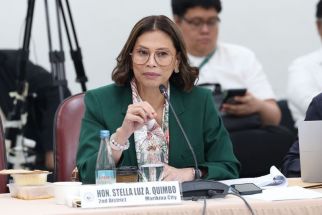How the CBCP probes clergy sexual abuse
August 6, 2017 | 8:30am

The church court does its investigation internally and all proceedings are conducted with utmost confidentiality. File photo
MANILA, Philippines — The human trafficking case filed against Taytay-based priest Arnel Lagarejos is one of the rare instances a member of the Roman Catholic clergy has been haled into a criminal court.
But the Catholic Bishops’ Conference of the Philippines (CBCP) is no stranger to complaints of sexual misconduct, including child molestation, against priests.
Retired Archbishop Emeritus Oscar Cruz, who is investigating 55-year-old Lagarejos following his arrest on July 28 for bringing a 13-year-old to a motel, has been leading the CBCP’s national tribunal that probes about 60 cases of clergy misconduct every year, including those against priests involved in money scandals, priests siring children, and pedophilic priests.
Last year, the tribunal looked into 14 cases of pedophilia, Cruz said in an interview months before the Lagarejos incident.
“As per experience, there are more cases of pedophilia. More of it,” he said.
The figure, however, is but a fraction of the actual number of cases, he pointed out, adding that bishops are empowered to conduct the investigation at the diocesan level and not all cases end up at the national tribunal.
Officially known as the National Appellate Matrimonial Tribunal and commonly referred to as the National Tribunal of Appeals, the 14-man special workforce headed by Cruz since 1984 handles the annulment of Catholic marriages in the country.
But it is known within the church to also investigate cases of sexual abuse committed by priests against children and cases of priest-fathers.
Church guidelines
The ongoing church investigation of Lagarejos for pedophilia is being done by the Diocese of Antipolo, which has jurisdiction over the arrested priest.
Antipolo Bishop Francisco de Leon had earlier designated Cruz as lead investigator and relieved Lagarejos from all his duties. Lagarejos has posted a P120,000 bail.
The Canon Law defines persons below 18 years as children. It classifies sexual abuse against prepubescent children aged 13 and below as pedophilia, and sexual abuse of pubescent males and females between 13 and 18 years as ephebophilia.
Localizing the Canon Law, the CBCP released the Pastoral Guidelines on Sexual Abuses and Misconduct by the Clergy in 2003 to guide bishops on how to deal with clergy sexual misconduct cases.
As part of their administrative work, bishops have the responsibility to decide on such cases in their dioceses.
The issuance of the guidelines, commonly referred to as “Protocols” by their crafters, was an acknowledgment by the CBCP of the existence of clergy sexual abuse in the Philippines. It was released a year after Pope John Paul II apologized for the injustices the Roman Catholic Church committed across the world, including sexual abuse of minors.
Under the Canon Law and CBCP’s guidelines, all dioceses and archdioceses should have a Tribunal of First Instance. A dissatisfied complainant may appeal the decision of the first instance tribunal to the National Tribunal of Appeals, where Cruz serves as overseer.
The national tribunal functions somewhat like the Supreme Court, where appeals and reconsiderations pertaining to disputes are filed before arriving at the best possible course of action.
It is composed of a judicial vicar (Cruz), an adjunct judicial vicar, seven judges, three defenders of the bond, an advocate and an ecclesiastical notary.
If still dissatisfied with the decision, the complainant may turn to Rome, the last stage of an appeal.
The Canon Law, however, considers cases involving the welfare of minors as grave and serious offenses. These cases should be sent for trial and judgment to the Vatican, specifically the Congregation for the Doctrine of the Faith (CDF).
The CDF’s primary responsibility is to apply equitable norms in disciplining guilty priests. It is also tasked to assist in the healing of victims and promoting programs to protect children and young people.
Outside of the national tribunal, Cruz investigates clergy sexual abuses only when a bishop seeks his help, as in the Lagarejos case.
Following church protocol, the Diocese of Antipolo, as the Tribunal of First Instance,will hold an independent canonical procedure as it looks into the complaint against the Taytay priest.
Cruz’ main task, along with that of a priest from the Antipolo diocese, is to gather pieces of evidence to establish whether Lagarejos is guilty or not of the charge filed against him.
Cruz said the documentation will be rigorous as “all sides of the stories will be heard before writing a recommendation to Lagarejos’ superior (De Leon).”
The recommendation to Lagarejos’ superior on what to do next will also be sent to the CDF in Rome for review and approval.
The church court does its investigation internally and all proceedings are conducted with utmost confidentiality. Only designated and assigned church officials like Cruz can hear and decide the cases. Only the local church and the Vatican will know the decision.
The reason for this is to protect the accused, who still has a right to a good name, the witnesses, the victim, and the process of how the church handles such cases, Cruz said.
Just penalties
Under the Canon Law, priests who break their vow of celibacy, including molestation of a minor, are to be punished with “just penalties.”
Just penalties include loss of clerical state, dismissal from the priesthood and laicization.
A priest loses his clerical state when all his rights and privileges as a priest such as celebrating the sacraments, exercising priestly functions and representing the Catholic Church are taken away.
Laicization is when the priest goes back to the lay life, where he can no longer perform his usual priestly functions.
Unlike the Canon Law, however, the CBCP’s 14-year-old Protocols tend to abet dioceses intent on protecting erring priests rather than disciplining them. For example, the local guidelines only suggest rehabilitation for a priest who breaks his vow of celibacy.
Rev. Fr. Reginaldo Mananzan, a Canon lawyer, said the common penalty for a priest who molests a minor is suspension and “loss of clerical state” by virtue of the Canon Law.
Mananzan said, however, not all priests guilty of sexual abuse lose their clerical state, with the penalty hinging on the gravity of the offense.
As bishop of Pampanga, Cruz was known for having defrocked a number of priests who were proven to have sexual affairs. As head of the national tribunal for more than three decades, he has recommended the dismissal of priestswhenthe accusationsagainst them were proven beyond reasonable doubt.
“If, without a shadow of doubt, the priest is guilty, and sometimes some priests own up to their mistakes, then the recommendation would be — he is out of the priesthood,” he said.
But Cruz said he has learned that some bishops ignore the recommendation. “That’s so irritating.”
Even as head of the national tribunal, Cruz has no authority to compel bishops to punish their priests. “Mine is only recommendatory. I did my part. It is up to them if they will do their part too,” he said.
But he said the dismissal of erring priests is the only way to help cleanse the ranks of the clergy.
“The church should learn from its ugly history, I am referring to the previous mistakes of cover-ups done in the past,” he said. “This should not be happening within the confines of the church because we preach justice, therefore we should practice justice once a crime is committed.”
Possible actions vs bishops
In a recent letter entitled “Motu Proprio,” Pope Francis mandated bishops to act and intervene immediately once informed or after receiving news that a priest has committed an abuse. A bishop who fails to do so is equally liable as the accused priest.
Negligence can come in the form of a bishop not taking any precautionary measures against the accused priest. One example is when the bishop fails to inform the accused priest that a case has been filed against him. Another is when the bishop fails to communicate preventive actions such as immediate removal of the accused priest from the parish where he serves.
Mananzan said a bishop’s failure to address the issue can also be grounds for his removal from the office. Canon Law 1389 says: “A person who through culpable negligence illegitimately places or omits an act of ecclesiastical power, ministry, or function with harm to another is to be punished with a just penalty.”
Vatican’s urgent order to bishops is, without doubt,intended to regain the trust of its flock. Priests abusing children “is a sin that shames us (the church),” the pope said in the letter.
(To be concluded)
(The author recently graduated with a bachelor’s degree in journalism from the University of the Philippines-Diliman. His article is based on his thesis, “Wolves in shepherds’ clothing,” done under the supervision of UP journalism professor Yvonne T. Chua. VERA Files is published by veteran Filipino journalists taking a deeper look into current Philippine issues. Vera is Latin for “true.”)
BrandSpace Articles
<
>
- Latest
- Trending
Trending
Latest
Trending
Latest
Recommended






























